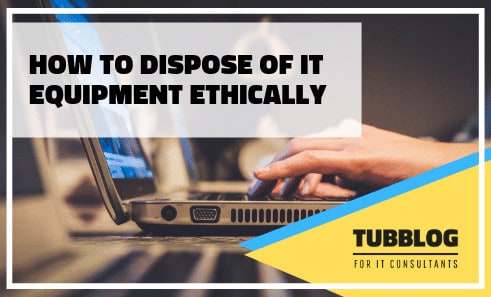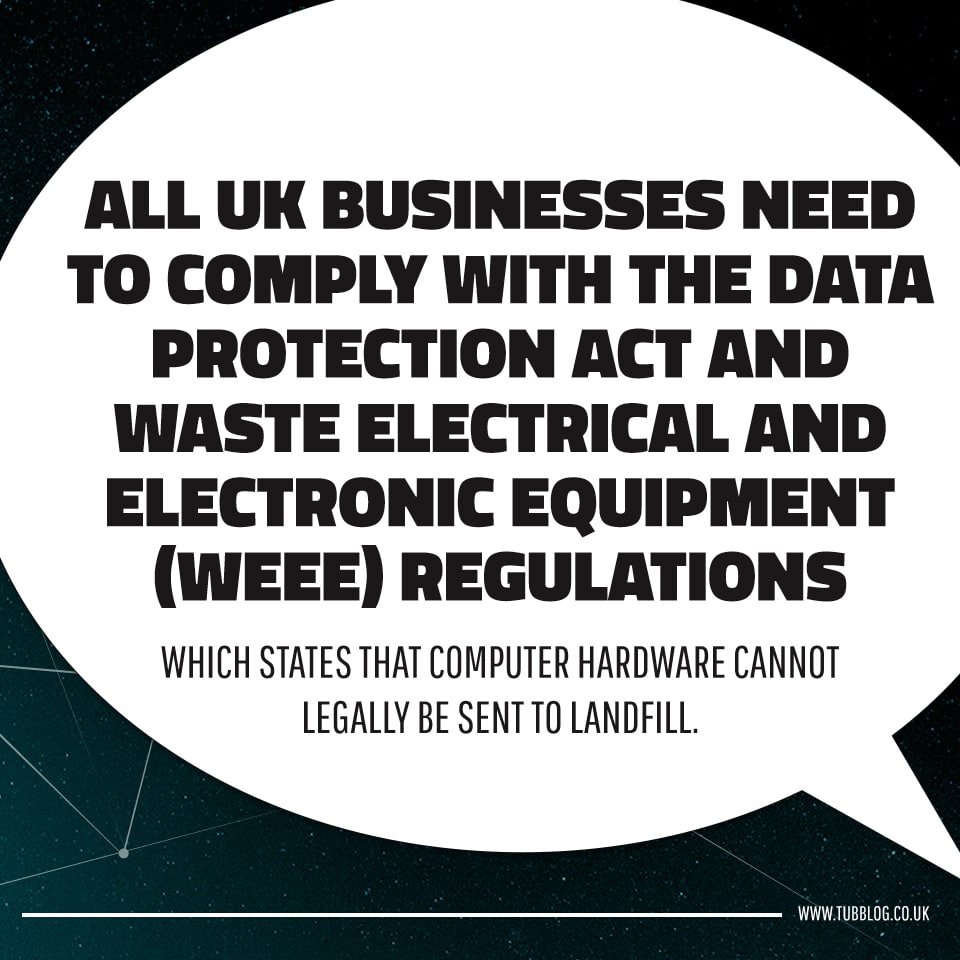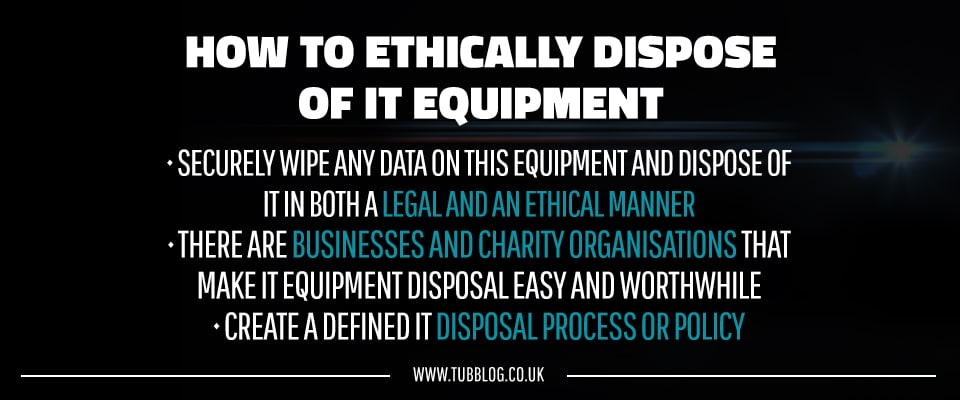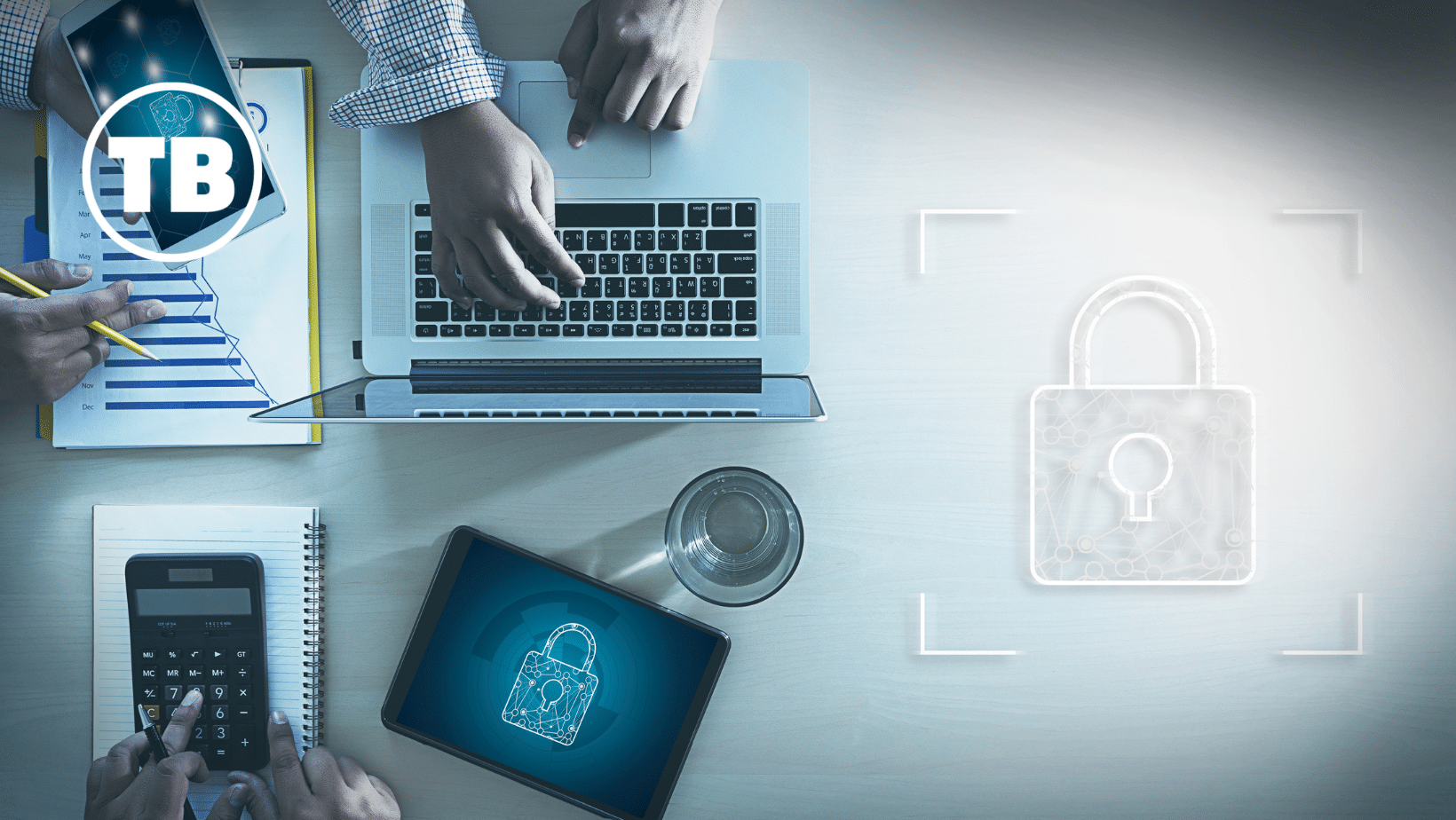There’s no avoiding it. Over time, many IT Solution Providers and Managed Service Providers (MSPs) end up collecting dead or obsolete IT equipment. Here we’ll cover the legal obligations that are upon us to dispose of IT equipment correctly but, first of all, beyond the legalities, why should we really care?
Why ethical IT disposal is important to your business
At the end of the day, the incorrect disposal of IT equipment poses a serious risk to health and to the environment.
I’m a firm believer that the standards you set in dealing with the small things lead to the culture of your business overall.
The odd shortcut here leads to another short cut there – and is that really the attitude you want your staff to subscribe to, or the type of business you want to grow?
The dangers of incorrect disposal of IT equipment has led to the introduction of the law surrounding it. So how can you make sure you stay on the right side of it?
Complying with regulations
All UK businesses need to comply with the Data Protection Act and Waste Electrical and Electronic Equipment (WEEE) Regulations which state that computer hardware cannot legally be sent to landfill.
Sadly, many companies think that an effective IT disposal policy means putting a nail through a hard disk drive and throwing old equipment into a skip but this is neither legal nor ethical.
So, here are some tips on how to dispose of IT equipment ethically.
 Protecting personal and private data
Protecting personal and private data
We have a responsibility to make sure that personal and private data don’t get into the wrong hands.
The Data Protection Act dictates that when you dispose of IT equipment, you ensure that all data from hard drives, CDs, DVDs and (often overlooked) backup tapes, need to be destroyed in a secure manner.
When it comes to destroying data on a hard disk, many people assume that a quick ‘Format’ will do the job. While a Format will give the appearance of data being wiped, the data is easily recoverable using many ‘off the shelf’ packages – so, in reality, the data has not been destroyed to any decent standard.
The package my own MSP has used in the past to destroy data securely was Active Killdisk. It’s available as a bootable USB Drive, CD-ROM or even a bootable Floppy Disk (useful for those old machines that won’t boot from USB). It wipes data to a military grade, making it impossible to recover.
The software is cheap to buy for small businesses and free for individuals.
 Recycle in an approved facility
Recycle in an approved facility
For IT companies, the Waste Electrical and Electronic Equipment (WEEE) regulations mean that electrical and electronic equipment should be broken down to a component level and recycled in an approved facility.
There are many specialist IT disposal companies who will do this for you – providing you with a certificate of disposal.
These companies will often also destroy any data and supply you with a data destruction certificate. This can be useful if you are disposing of large amounts of client equipment and the client wants assurances of the security of their data.
 Consider donating and recycling
Consider donating and recycling
Most smaller MSPs don’t need to dispose of large quantities of kit – rather it’s the working but ancient PC, or working but unwanted old printer or monitor that sits in the office gathering dust.
Why not donate this equipment to a new home?
Websites such as Freegle and Freecycle encourage you to not throw stuff away, but give it away!
After ensuring any IT equipment is securely wiped of data, you can list the hardware on your local Freegle website and receive emails from individuals who are interested in taking it off your hands.
My own MSP gave away old laptops, PCs, printers, routers and switches, and even components like hard drives, SIMM and DIMM memory and graphics cards to hobbyists or students. It felt good knowing that the equipment would find a new lease of life.
As the saying goes, one person’s junk is another person’s treasure!
 Build a relationship with charities
Build a relationship with charities
Many charities will take your equipment and repurpose it for a good cause.
The wonderful Computers for Charities takes your old equipment from you (often collecting it directly from you) and refurbishes the items, securely destroying all data.
They then work with Charities across the UK and abroad to distribute the new hardware.
I’d encourage you to check out the work Computers for Charities do, at both home and abroad – it should leave you with no doubt that your old IT equipment can be used to make someone else’s life better.
 Communicating your disposal process with your client
Communicating your disposal process with your client
Whichever route you use to ethically dispose of your IT equipment, it’s worth communicating this fact to your clients.
I’d suggest creating a short document or page on your website that explains how your business deals with IT disposals and why it’s important to you to do so ethically.
Sharing your process with your clients helps both reassure them and set the tone for the type of business they are working in with you.
 Conclusion
Conclusion
Whether your IT business has a small amount of IT equipment to dispose of occasionally or deals with disposals on a more regular basis, you should look to securely wipe any data on this equipment and dispose of it in both a legal and an ethical manner.
There are businesses and charity organisations that make IT equipment disposal easy and worthwhile – and the standards you set communicate a message to both your employees and your clients about the type of business you run.
If you don’t have a defined IT disposal process or policy in place, I hope this blog post will encourage you to give it some thought.


















Comments
9 thoughts on How to Dispose of IT Equipment Ethically
MIKE HUDSON
26TH AUGUST 2013 07:58:23
Great article, one other tip for your readers - We also put our decommissioned kit to use on the Folding@Home project. :-) Every time someone tries to dump and old PC I grab it, install Linux and the folding client and add it to my 'farm' If you can find the space, and don't mind the increase in your electricity bill - donate your old kit to this very worthy cause.
RICHARD TUBB
28TH AUGUST 2013 08:07:21
Mike - what a great way to use old equipment! Thanks for sharing!
ETHICS AND THE LAW: THE IMPLICATIONS OF THE WEEE DIRECTIVE | GREEN LONDON
1ST SEPTEMBER 2013 23:20:43
[…] How to Ethically Dispose of IT Equipment (tubblog.co.uk) […]
CHRIS WARD
4TH SEPTEMBER 2013 12:25:06
Also, if you are based in the Hampshire area, Jamies Computers are another excellent charity who will collect and responsibly reuse/dispose of IT equipment and get homeless people into a career in IT. And won't cost you a penny. We have used them for many years. http://www.jamies.org.uk/
RICHARD TUBB
5TH SEPTEMBER 2013 05:23:18
Chris - thanks for sharing!
DANZ
27TH JANUARY 2014 18:21:49
When giving equipment away are there any requirements to ensure that the person you're giving them to will ensure proper disposal? For example, should items find their way to a landfill and be traced back to the original owner I presume they would be liable for any fine if they can't produce documentation they gave the equipment to someone that said it would be disposed of properly. I know that when leasing equipment from BT and we didn't return it they required us to sign something to this effect.
RICHARD TUBB
28TH JANUARY 2014 10:42:30
Hi Danz - yes, if you're working with a reputable IT disposal company then they should issue you with a certificate to acknowledge receipt of the equipment, to offer an assurance that they will securely wipe any data on the device, and that they will responsibly dispose/recycle the equipment.
FRANKLIN BOLAND
3RD JULY 2015 11:44:18
Minos Technology Is a IT disposal company that markets to MSPs. MSPs get a percentage of the sales if they refer their end user to Minos. The disposal of the equipment follows all DoD standards and end user branded reports are given to the end user for all data being removed. This is a great way for the MSP to increase their monthly income on a recurring basis. If interested please email sales@minostech.com
RICHARD TUBB
4TH JULY 2015 11:16:39
Franklin - thanks for sharing. Your website doesn't give any indication of where you are geographically located. Is it a US service, or global?